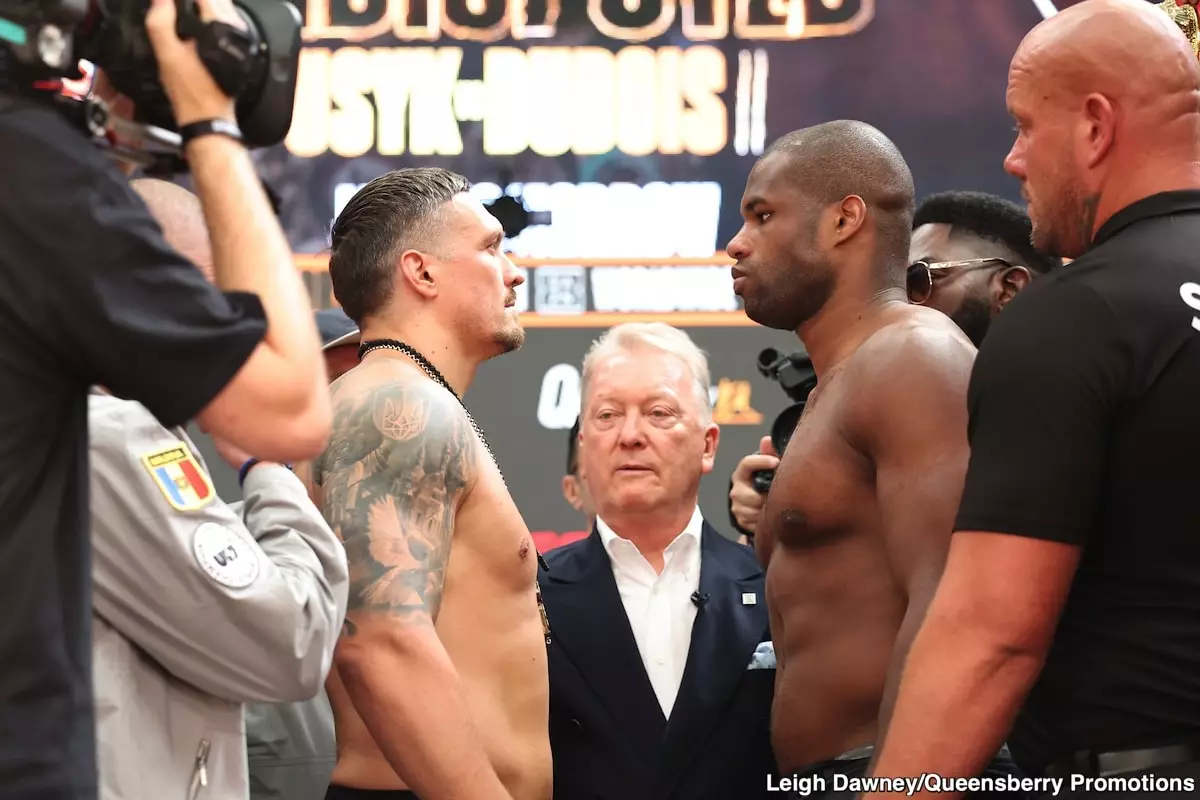In a stunning display of skill, resilience, and strategic brilliance, Oleksandr Usyk secured his status as the undisputed heavyweight champion by delivering a decisive fifth-round knockout over Daniel Dubois at Wembley Stadium. This victory shattered lingering doubts about his ability to impose his style on the larger, more power-driven heavyweight division. While many anticipated a grueling decision or an endurance battle, Usyk’s calculated aggression and tactical awareness turned the tide swiftly, illustrating that he is not merely a cruiserweight remade for heavyweight battles but a true force capable of dictating the course of the division.
The manner in which Usyk dismantled Dubois reflects his evolution as a fighter who refuses to be confined by conventional expectations. His ability to adapt, punch with both precision and timing, and capitalize on his opponent’s mistakes exemplifies his mastery. Critics often underestimated his punching power, merely dismissing him as a slick technician lacking knockout prowess at heavyweight. However, his two clean, devastating knockdowns in the fifth round dispel this misconception, affirming that Usyk’s offensive arsenal is more versatile than many credit.
What distinguishes Usyk’s victory is his mental toughness—remaining composed despite the pressure, seizing opportunities when they arose, and demonstrating command over the entire fight. This performance solidifies his legacy, not just as a technically proficient boxer, but as a fighter willing to take risks to achieve greatness. The confidence he displayed sends a message to the division: the era of Usyk dominance has truly begun.
Dubois’ Frustration and the Power Dynamics in Modern Heavyweight Boxing
Daniel Dubois entered the ring with momentum—streaking through recent opponents like Anthony Joshua and Filip Hrgovic—and with a narrative of relentless power. His victories fed a rising confidence and a belief that he could topple Usyk’s technically refined, elusive style. However, the result showcased the harsh reality: power alone cannot secure victory against a tactician like Usyk. Dubois’s aggressive overreach in the fifth round exemplifies how frustration can undermine even the most promising plans.
Dubois’s tendency to resort to reckless aggression—overextending with punch attempts—revealed a vulnerability. Instead of being the measured, calculated boxer he needed to be, he overcommitted, leaving openings for Usyk’s counterattack. The knockdowns, especially the powerful left hook that sent him tumbling, exposed a fundamental flaw: Dubois’s chin and defensive positioning remain areas of concern. His inability to withstand Usyk’s precise shots raises questions about his resilience at the highest level.
Furthermore, Dubois’s approach underscores a larger narrative within heavyweights—mass, power, and raw aggression are insufficient if not coupled with defensive discipline and tactical patience. His recent win streak, while impressive on paper, was against opponents lacking the agility or strategic intelligence to punish his overconfidence. Against Usyk, who thrives on exploiting opponents’ mistakes, Dubois’s reactive frailty was on full display. His journey forward depends on addressing these flaws if he aspires to remain relevant at the summit of the division.
The Underlying Combat Dynamics and Future Implications
The undercard fights provided a window into the current landscape of heavyweight and cruiserweight boxing—highlighting fighters with potential and flaws that define their trajectories. Lawrence Okolie’s unanimous decision victory, overshadowed by questions about his weight and stamina, reveals a fighter caught between raw physical advantage and technical refinement. His added mass, much of it fat, seemingly hampers his speed and endurance—factors that could impair his capacity to rise further in the division.
Meanwhile, the close decision for Daniel Lapin against Lewis Edmondson demonstrates that amateur-style boxing, with its point-scoring focus, may not always translate seamlessly into the professional realm. It also signals that emerging talents need more than just skill—they require strategic flexibility and mental resilience to secure decisive victories.
Dacres’s dominant performance over Sirenko further underscores the importance of speed, defense, and timing. His ability to outbox a slower opponent echoes a growing trend in heavyweight boxing: those who can combine technical prowess with mobility gain a distinct edge. For fighters like Dubois, this is a stark reminder that brute strength must be complemented by agility and strategic discipline.
Looking ahead, Usyk’s victory raises intriguing questions about the future of heavyweight boxing. His savvy, technical style poses a challenge to more traditional power punchers. It suggests that the division is evolving beyond mere mass and knockout power to a more nuanced, skill-based format. His success also signals a shift: fighters who can blend exceptional movement, timing, and ring IQ can dominate in an era increasingly dominated by raw physicality.
Dubois’s setback may serve as a wake-up call. To reassert himself, he must evolve beyond the reckless impatience that cost him against Usyk. His recent knockout streak, though impressive, was against opponents less capable of exploiting his weaknesses. The question remains whether he can adapt and refine his approach or if he will continue to be plagued by lapses in focus and resilience.
In essence, this night at Wembley reinforced that heavyweight boxing is more than a contest of power; it’s a battlefield of strategy, endurance, and mental strength. Usyk’s victory didn’t just add another title to his collection—it challenged perceptions and redefined what it means to be a dominant champion in the modern era. The division is shifting, and the fighters who can blend technical mastery with mental toughness will shape its future.

